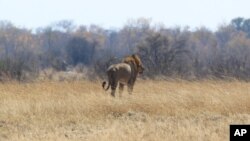Zimbabwe has partially lifted restrictions on big game hunting around Hwange National Park imposed earlier this month after an international outcry over the killing of Cecil, the country's most prized lion, by a U.S. trophy hunter.
The Zimbabwe Parks and Wildlife Authority, or Zimparks, said in a statement Monday that the ban remained in place for two private game parks and rural communities near the park.
In the areas where the ban has been rescinded, all lion, leopard and elephant hunts will require written confirmation from the head of the parks authority and park staff must accompany each hunt.
Individuals caught engaging in illegal hunting will be "banned from hunting for life," Zimparks warned. It said such hunters "tarnish the image of the hunting industry and their actions border on economic sabotage."
Authorities on August 1 suspended hunting of lions, leopards and elephants in the area around Hwange after Cecil — a favorite with visitors to the park — was shot by American dentist Walter Palmer with a bow and arrow.
The rare black-maned lion was killed on one of the farms adjacent to the park where the ban on big game hunts remains in force.
Palmer paid $55,000 to shoot Cecil in early July.
The killing of the lion, which was being tracked as part of an Oxford University research project, provoked outrage among animal lovers worldwide. Zimbabwe has requested that the United States extradite Palmer to face charges over the hunt.
Palmer's guide on the expedition, Theo Bronkhorst, appeared in court last week.
He was granted $1,000 bail pending his trial on September 28 on charges of organizing an illegal hunt.
Lion bones trade
Meanwhile, conservationists are warning of a new potential threat to Africa's wild lion population — the increasing use of lion bones to replace tiger bones in traditional medicine in parts of Asia, the Associated Press reported.
The lion bone trade — which has surged since around 2008 — is mostly based on the legal hunting of captive-bred lions in South Africa, with negligible impact on the country's wild lion population, according to a study released last month.
Lions are designated as vulnerable on an international "red list" of species facing threats.
The International Union for Conservation of Nature has pointed to successful lion conservation in southern Africa, but said lions in West Africa are critically endangered and rapid population declines were recorded in East Africa.
There are more than 9,100 lions in South Africa, two-thirds bred in captivity, according to the report. Estimates of the continent's wild lion population vary. Some experts cite 20,000 or so, a sharp drop from past decades.












